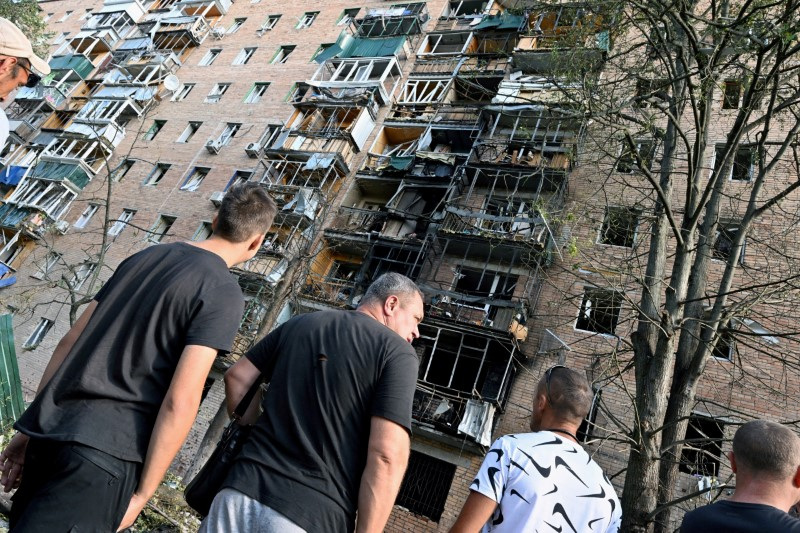“Ukraine is advancing deeper into Russia, Zelenskiy says”, Reuters
By Guy Faulconbridge and Pavel Polityuk, August 14, 2024
People gather in the courtyard of a multi-storey residential building, which according to local authorities was hit by debris from a destroyed Ukrainian missile, in the course of Russia-Ukraine conflict in Kursk, Russia August 11, 2024. Kommersant Photo/Anatoliy Zhdanov via REUTERS/File Photo

Summary
- Ukraine attacks Russia with 117 drones, Russia says
- Biden says incursion is ‘a real dilemma for Putin’
- Russian National Guard beefs up security at nuclear plant
- Russia fighting intense battles in Kursk, bloggers say
- Russian lawmaker: West is poking the bear
MOSCOW/KYIV, Aug 14 (Reuters) – Ukraine said on Wednesday its forces had advanced further into Russia’s Kursk region in the biggest foreign incursion into Russia since World War Two, posing a dilemma for President Vladimir Putin according to U.S. President Joe Biden.
Thousands of Ukrainian troops rammed through the Russian border in the early hours of Aug. 6 into Russia’s western Kursk region in what Putin called a major provocation aimed at gaining a stronger hand in possible future ceasefire talks.
Ukraine has carved out a slice of the Russian border region of Kursk and though Putin said the Russian army would push out the Ukrainian troops, more than a week of intense battles have so far failed to oust them.
Ukrainian President Volodymyr Zelenskiy said Kyiv’s forces were continuing to gain ground in the Kursk region and that they had taken another one to two kilometres on Wednesday.
“We continue to advance further in the Kursk region,” Zelenskiy wrote in a statement on Telegram, “from one to two kilometres in various areas since the start of the day. And more than 100 Russian prisoners of war in the same period.”
Russia’s defence ministry said 117 Ukrainian drones had been shot down within its territory overnight, mostly in the Kursk, Voronezh, Belgorod and Nizhny Novgorod regions. It said missiles had also been downed, and showed Sukhoi Su-34 bombers striking Ukrainian positions in the Kursk region.
Later, the ministry said Russian forces had repelled a series of Ukrainian attacks inside the Kursk region, including at Russkoye Porechnoye 18 km (11 miles) from the border, and pro-Russian war bloggers said the front has been stabilised.
The Ukrainian drone attack included strikes on four Russian military airfields in an attempt to undermine Russia’s ability to attack Ukraine with gliding bombs, a Ukrainian security source told Reuters on condition of anonymity.
Russia’s National Guard said it was beefing up security at the Kursk nuclear power plant, located just 35 km (22 miles) from the fighting.
The Ukrainian assault into Russian territory has dramatically changed the narrative around the two-and-a-half-year-old war. Russia had been advancing in eastern Ukraine since the failure of Kyiv’s 2023 counteroffensive to make any major gains against Russian forces.
But Ukraine’s unprecedented incursion also comes with major risks for Russia, Ukraine and the West, which is keen to avoid a direct confrontation between Russia and the U.S.-led NATO military alliance that has helped arm Kyiv against Moscow.
Biden said U.S. officials were in constant touch with Ukraine over the incursion, which he said had “created a real dilemma” for Putin, who ordered thousands of troops into Ukraine in February 2022.
The White House said Ukraine gave no advance notice of its incursion and the United States had no involvement. Russian officials have suggested Ukraine’s Western backers must have known of the attack.
“Of course they are involved,” Russian lawmaker Maria Butina told Reuters. “It looks even worse when they say they don’t know anything and put all the responsibility on Ukraine.”
RUSSIA ON DEFENSIVE
Russian state television said Russian forces were turning the tide on the Ukrainian forces, showed footage of successful attacks on Ukrainian positions and gave wide coverage of the evacuations of Russian civilians from the border zone.
Ukraine’s top commander, Oleksandr Syrskyi, said that the Russian town of Sudzha, a transhipment hub for Russian natural gas flowing to Europe via Ukraine, was fully under Ukrainian control. Natural gas was still pumping on Wednesday.
By bringing the war to Russia, Ukraine has forced nearly 200,000 Russians to evacuate border regions near the site where during World War Two in 1943 the Red Army defeated Nazi forces in one of the world’s biggest ever tank battles.
Putin said on Monday that Ukraine “with the help of its Western masters” was aiming to improve Kyiv’s negotiating position ahead of possible peace talks.
But he questioned what negotiations there could be with an enemy he accused of firing indiscriminately at Russian civilians and nuclear facilities.
The Russian rouble weakened against the dollar on Wednesday, and has lost 8.5% since the start of the Ukrainian incursion.
Russian officials say Ukraine is trying to show its Western supporters that it can still muster major military operations as pressure mounts on both Kyiv and Moscow to agree to talk about halting the conflict, Europe’s biggest since World War Two.
Zelenskiy has said the incursion is meant to pressure Russian forces and “restore justice” after Russia’s invasion.
The offensive brings risks for Kyiv: Ukraine may leave other parts of the front on home soil exposed by dedicating forces to fighting in Russian sovereign territory. Russia controls 18% of Ukrainian territory and has been gradually advancing recently.
Russian military bloggers said they expected Ukraine to make at least one more major move over coming days. In Russia’s border region of Belgorod, the governor, Vyacheslav Gladkov, declared a regionwide state of emergency.
“The situation remains difficult,” Yuri Podolyaka, an influential Ukrainian-born, pro-Russian military blogger, said of the situation in Kursk.
“The enemy still has the initiative, and so, albeit slowly, it is increasing its presence in the Kursk region.”
The Reuters Daily Briefing newsletter provides all the news you need to start your day. Sign up here.
Writing by Guy Faulconbridge in Moscow, Lidia Kelly in Melbourne and Tom Balmforth in Kyiv; editing by Jamie Freed, Mark Heinrich and Ros Russell